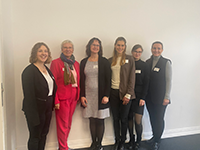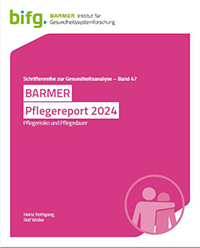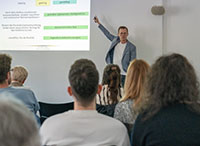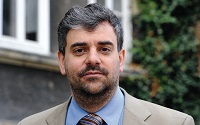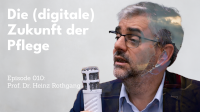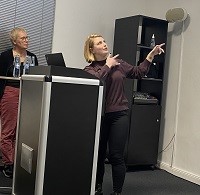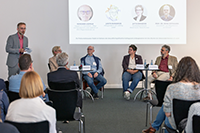
Rund 100 Teilnehmer:innen besuchten die erste Podiumsdiskussion des Gesundheitspolitischen Kolloquiums am 21.05.2025 im Haus der Wissenschaft. Im Zentrum der Diskussion standen drängende Herausforderungen in der Pflege sowie notwendige politische Maßnahmen nach der Bundestagswahl. Organisiert wurde die Veranstaltung in Kooperation mit dem Alumni-Verein der Universität Bremen.
Auf dem Podium diskutierten Gäste aus Wissenschaft und Praxis: Judith Burgmeier (Mitgründerin des ambulanten Pflegedienstes vielfältig. GmbH), Jutta Dernedde (Vorstandsvorsitzende des Medizinischen Dienstes Bremen), Reinhard Leopold (BIVA-Pflegeschutzbund, Selbsthilfe-Initiative "Heim-Mitwirkung" und „wir pflegen - Interessenvertretung und Selbsthilfe pflegender Angehöriger e.V.“) sowie Prof. Dr. Heinz Rothgang (Gesundheits- und Pflegeökonom am SOCIUM). Moderiert wurde der Abend von Prof. Dr. Matthias Zündel (Integrierter Gesundheitscampus Bremen). Doch nicht nur das Podium zeichnete sich durch eine breite Expertise aus, auch unter den etwa 100 Gästen im Publikum befanden sich viele Personen, die sich aus unterschiedlichen Perspektiven mit dem Thema Pflege beschäftigen. So diskutierten unter anderem Pflegekräfte, Mitarbeitende von Krankenkassen, pflegende Angehörige sowie Studierende der Universität Bremen angeregt mit.
Personalmangel und Finanzierungsfragen als Herausforderungen für die neue Bundesregierung
Das viel diskutierte Problem des Personalmangels wurde auch an diesem Abend prominent diskutiert: Die Expert:innen machten dabei aber deutlich, dass nicht, wie häufig angenommen, die Bezahlung das Hauptproblem darstellt – diese hat sich in den letzten Jahren erheblich verbessert. Vielmehr sind es die immer schwierigeren Arbeitsbedingungen, die dazu führen, dass Pflegekräfte den Beruf verlassen. Unzureichende Personalschlüssel, unplanbare Arbeitszeiten und die daraus resultierende Dauerbelastung schaffen einen verhängnisvollen Kreislauf: Wegen Personalmangels steigt die Belastung, was noch mehr Pflegende zum Berufsausstieg bewegt. Auch die Anwerbung von Fachkräften aus dem Ausland stellt keine Universallösung dar: für diese sind englischsprachige Länder oft attraktiver, auch die Eingliederung in das deutsche Gesundheitssystem gestaltet sich teils schwierig.
Auf die Pläne der neuen Bundesregierung im Bereich der Pflege angesprochen, musste Prof. Rothgang vor allem eine Leerstelle feststellen: „Im Koalitionsvertrag steht zum Thema Pflege nicht viel. Aber nur weil nichts drinsteht, heißt das nicht, dass auch nichts passieren wird“, äußerte er sich dennoch vorsichtig optimistisch. Neben dem Personalmangel diskutierten die Podiumsgäste auch die Finanzierung der Pflege als eine der drängenden Herausforderungen für die Politik. Insbesondere für Pflegebedürftige und pflegende Angehörige stellen die seit Jahren stark steigenden Eigenanteile eine massive Belastung dar. Bei diesem Thema – wie auch in anderen Bereichen – waren sich die Podiumsgäste weitgehend darüber einig, dass es nicht an Reformkonzepten, sondern an deren Umsetzung mangelt.
Probleme gemeinsam anpacken – miteinander statt gegeneinander
Ein weiterer Schwerpunkt der Diskussion lag auf Vertrauensproblemen zwischen den verschiedenen Akteur:innen im Pflegesystem. Die Podiumsteilnehmer:innen identifizierten – auch in der Diskussion mit dem Publikum –Vertrauensdefizite zwischen Krankenkassen, Medizinischem Dienst, stationären Einrichtungen und ambulanten Pflegediensten als ein Hindernis für Verbesserungen. Diesen gelte es zu begegnen, um gemeinsam die Probleme in der Pflege anzupacken: nur miteinander statt gegeneinander könne man dies schaffen.
Das Gesundheitspolitische Kolloquium ist eine gemeinsame Veranstaltungsreihe des SOCIUM - Forschungszentrum Ungleichheit und Sozialpolitik der Universität Bremen, dem Integrierten Gesundheitscampus Bremen und dem Wissenschaftsschwerpunkt „Health Sciences“. Weitere Informationen zur Veranstaltungsreihe finden Sie hier.
Eintragen auf den Verteiler für Informationen über zukünftige Veranstaltungen ist über folgende E-Mail-Adresse möglich: gpk.socium@uni-bremen.de



